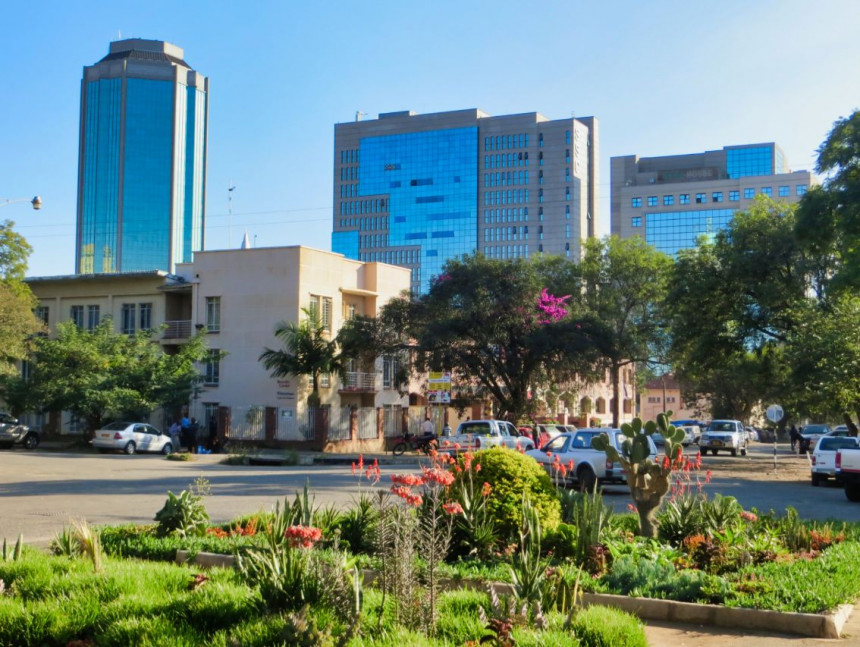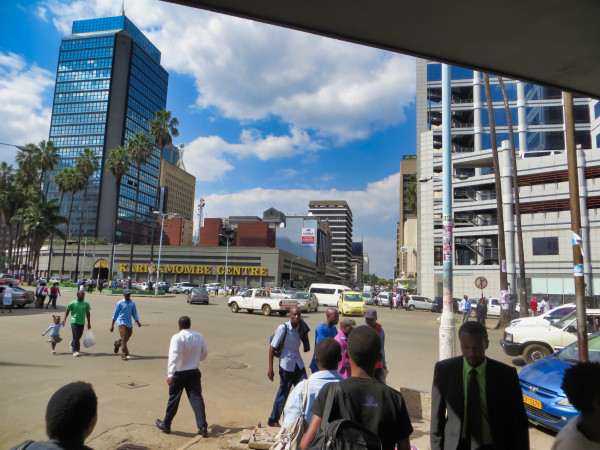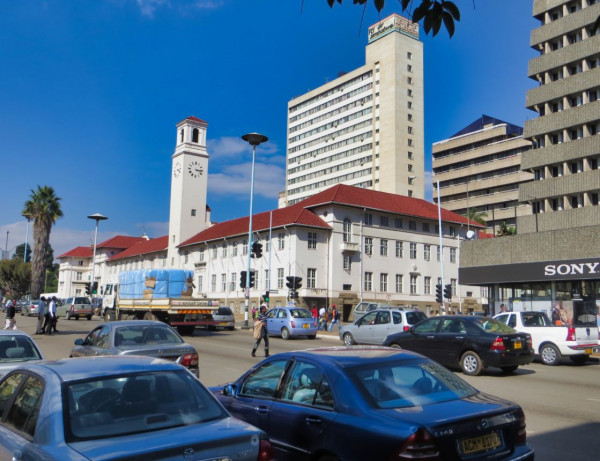Myths and reality about the colonization of Africa

When I published an article in the summer about my observations in Africa, where I mentioned, among other things, that I had been to Africa five times, I received a huge wave of criticism from the “real” experts of Africa (read: those who survive on the grants received from this topic) that understanding Africa does not depend on the number of visits to the continent, but on the number of "scientific" publications. The word - scientific - can definitely be put in quotation marks in this case, because there are few topics that are more ideological than those concerning Africa, colonization and the problems of black people.
The main idea of my observations in Africa was quite simple. Almost all the good that is in Africa is the legacy of so-called colonization - railways, buildings, schools, institutes, the judiciary, Christianity too, which in the African context can definitely be seen as positive, and much more. Consequently, this relatively short period of colonialism (from the end of the 19th century to 1960, when the colonial system practically ceased to exist) cannot be unequivocally assessed negatively. It has played some positive role in the development of this continent.
The "experts" immediately shoved in my face the slave trade (which had existed in Africa long before the arrival of whites and was exterminated thanks to the Europeans), the atrocities of King Leopold II of Belgium in the Congo (no one denies them and they are indeed a huge mark of shame for white people) and the colonial looting of African wealth. It is precisely this "colonial looting" that I want to talk about in more detail, all the more so because from this "axiom" new, far-reaching constructions are created. For example, the idea of the prosperity of the West due to looting the rest of the world. But what is the reality?
Profits or a bottomless pit?
In general, when it comes to the colonization of Africa, the aforementioned atrocities in the Congo and the allegedly tough exploitation of African indigenous peoples in mining, agriculture and railway construction are invoked. It is automatically assumed that the white colonists made a fabulous profit from using Africa. However, we must begin with the fact that colonialism in the 20th century was quite different from colonialism in the 16th-19th centuries. In the 20th century, slaves had not been traded for a long time and no one was forced to work. Tens of thousands of workers from India had to be brought in to build the Mombasa-Nairobi-Kampala railway in what is now Kenya and Uganda because the locals simply did not want to work. It was below them, and no one forced them to do it.
But the main false cornerstone of the colonial story is different. The African colonies were not a source of prosperity for its metropolises, but a bottomless money draining pit. The investment in colony development was significantly GREATER than the benefits these metropolises received. For example, in the German colonies in East Africa (where I myself have been and seen the German heritage), between 1880 and 1914 the income covered only 60% of investment. The expansion of the colonies was more imperial (influence, might) than economic. The French and English colonies in Africa were also loss-making. These losses were particularly great after World War II, when spending on infrastructure, the education system and medical care increased several times.
Proponents of colonial exploitation theory seek to circumvent this negative balance of total income and expenditure by pointing out that the return on capital of private investors in Africa has been higher than the same return on capital in metropolises. The weak point of this argument is that this difference in return on capital is now much greater, because who would invest so far away in Africa if they could earn more by investing here in Europe. During colonialism, such a return as now could not be expected.
Colonies developed faster
However, the results of colonial exploitation are most evident in the book Burden of Empire: an appraisal of western colonialism in Africa south of the Sahara by L. H. Gann and Peter Duignan. In this book, the authors compare the development of Southern Rhodesia (now Zimbabwe) and Ethiopia. Until the 1980s, the territory of present-day Zimbabwe was inhabited by tribes whose level of development did not exceed that of the early Iron Age. I myself have been to Zimbabwe and I know the history of this country with its ancient statehood. The only misfortune is that nothing of this statehood was left at the end of the 19th century, and the disappearance of this statehood had nothing to do with the white people who appeared there only in the second half of the 19th century.
At a time when indigenous tribes lived in Zimbabwe, Ethiopia was a country with an ancient culture, writing, and it was somewhat civilized. Ethiopia is the only African country (excluding Liberia, which has a special status) that has never been colonized. Therefore, by comparing the development of Southern Rhodesia and Ethiopia, we can draw some conclusions.
In 1980, when the white minority in Zimbabwe handed over power to the black majority (thanks to sustained pressure from the West), it was one of the most developed countries in sub-Saharan Africa (second only to South Africa), while Ethiopia was one of the continent's poorest countries. Almost all the famous photos of starving children were taken in Ethiopia.
Decolonization is accompanied by degradation
In 1960, 18 African countries gained independence, and over the next four years, all the English and French colonies became independent. Portugal retained its colonies, while South Africa and Southern Rhodesia were already independent countries, with power being maintained by a white minority living there for generations.
Africa became independent in 1960, but the next 60 years can't be called prosperous. Moreover, if for 50 years Africa had been a fast-developing haven of peace, with almost no wars, famine and massacres (Congo atrocities took place before that), then with the collapse of the colonial system and the independence of nations, pre-colonial social problems returned to Africa - huge social inequality, abuse of power, tribal wars and even genocide (Rwanda). All cases of famine in Africa are related to the post-colonial period (or Ethiopia, which has never been a colony).
The dynamics of economic development (GDP growth) in white-dominated Africa in the first 60 years of the 20th century (before decolonization) significantly outpaced the growth rates of other developing countries (Asia and Latin America) and are comparable to those of developed countries. The situation changed radically after 1960. All countries with lower per capita GDP in 2020 than in 1960 are in sub-Saharan Africa. According to World Bank data, the average GDP growth of 41 sub-Saharan African countries between 1960 and 2005 was 0.5% per year, while for 57 other developing countries on other continents, average GDP growth over this period was 3% per year. Meaning, six times larger.
If we talk about the ambiguous assessment of colonialism, then the correlation of the economic development of the Caribbean countries with the year they gained independence is very significant. It is almost linear - the earlier a country has gained independence, the poorer it is today. The poorest is Haiti, which first gained independence in 1803, but the most prosperous are the territories that still count as European colonies.
As Europeans left, the former colonies retained the metropolitan legal system, public administration, the education system, and even some seedlings of democracy. Initially, in the 1960s, when everything was still running on the inertia, many African countries were relatively successful, but soon the institutions of government that the white people had left rapidly degraded and became corrupt, and in many places uneducated, yet ambitious and energetic figures came to power, which are still used to scare children.
The sad story of Zimbabwe
The story of South Africa and Zimbabwe is especially noteworthy, where white people remained in power the longest in the black Africa and where, despite very severe Western economic sanctions, it had the highest standard of living (including for black people) at the time. In 2014, I traveled to Zimbabwe partly because I wanted to see what this country looks like, as it is often cited as the most notable example of economic collapse. The capital of Zimbabwe somewhat surprised me with its modernity and certain order. I am writing this article partly because I know very well that Zimbabwe had long been a relatively developed, independent, white minority-ruled country, so I assumed that there would be a lot left of the old owners. Of course, there were signs of degradation everywhere, but it must be admitted that Harare did not look like the capital of a country that had survived an economic collapse.

Two things showed that something was wrong with the public financial system. Huge queues of people at the banks (I still don't know why they were standing there) and the unimaginably worn-out US dollar banknotes, which were and still are the official means of payment in Zimbabwe (along with the South African rand and Botswana pula as chump change). It should be noted that, despite this economic and financial turmoil, all moderately large stores had cash registers.

It was only later that I learned that almost the entire pleasant city center and the adjoining areas where foreign tourists stay were built in Rhodesian times.
Unfortunately, since independence and, in particular, since the expropriation of white property in 2000, everything has gotten worse in Zimbabwe. One white woman (a local) of hard-to-determine age in very ragged clothes stuck in my mind, who had packed a shopping cart full of cheap local vodka in a self-service shop. I'm not saying that the cause of her alcoholism is a complete sense of hopelessness, but this feeling could be felt everywhere. It vibrated in the air. Also in the monotonous, four-hour speech of the then President Robert Mugabe to the people, in honor of Independence Day on April 25. When we went to one store in the morning, it could be heard from the nearby speaker, but when we went to another store again in a completely different city several hours later, his sluggish, bland speech was still going on. He was already over 90 at the time. It should be noted that there was no respect afforded for his speech. Shoppers talked to each other, laughed, joked, as if the usual music was playing in the background, not a dictator, whose armed forces everyone is afraid of.

Today, Zimbabwe's GDP per capita has fallen by 35% since 1980 and has fallen below 1960 levels. In South Africa, where a relatively large white community has remained (around 5 million - 8.5%), the decline is less catastrophic, but the country's development has slowed significantly. If in 1980 South Africa was at the same level as Mexico, Portugal or Chile in terms of GDP per capita (at more than 90% black people), now it has slipped far below and is located between Iran, Paraguay and Peru. Interestingly, it is quite far below the neighboring Botswana, which, along with Gabon and Equatorial Guinea, can be considered rare African success stories without the need to put the phrase in quotation marks. In this trio, Botswana should be given special emphasis as the country that has succeeded the most in implementing the European order and at the same time moving away from the local order typical of the rest of Africa. Truth be told, Africa has been experiencing relatively rapid economic development in recent years and it is to be hoped that it will have successfully overcome the difficulties of the post-colonial era.
You may ask, what was the point behind this whole article? Just that you shouldn't pollute people's brains with ideologically charged theories that have no or very minimal connection to reality. I wrote this article only out of respect for the truth and disgust for lies and widespread fabrication.
*****
Be the first to read interesting news from Latvia and the world by joining our Telegram and Signal channels.